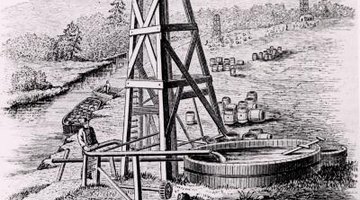Edwin Drake used a steam engine to drill for oil, beginning in the late 1850s. Prior to this, crude oil had been collected in small amounts by skimming it from the surface of pond water or from pits and ditches after seeping from natural deposits. Drake correctly believed he could access larger deposits of oil using steam-powered drilling methods already widely used for mining salt. He was mocked for his belief, and even ordered to stop drilling by his investors after his early attempts were unsuccessful.
Black Gold
Drake was vindicated when he struck oil 69 feet below the ground near Titusville, Pa. on August 28, 1859. Drake's revolutionary method of extracting oil from the ground allowed him to produce oil much more efficiently than other methods of the time. This discovery made oil a commercially viable product and ushered in the start of the oil industry with a boom in Pennsylvania. But Drake never patented his method. Fired by his company, his money lost on Wall Street, he died in near-poverty in 1880.
Related Articles
References
Writer Bio
Dell Markey is a full-time journalist. When he isn't writing business spotlights for local community papers, he writes and has owned and operated a small business.











